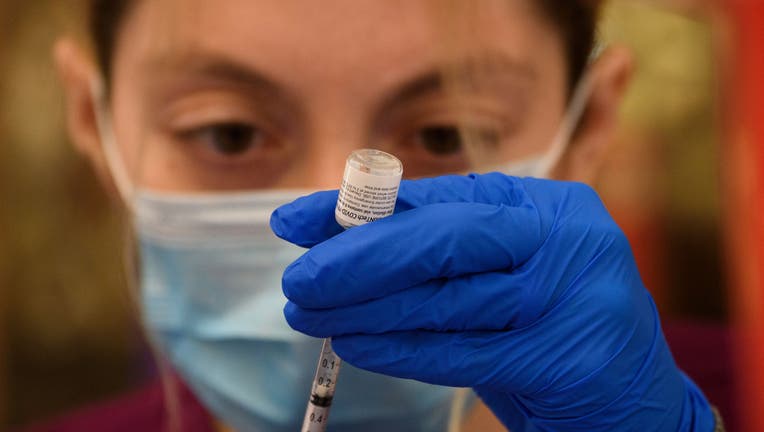Comirnaty: Pfizer-BioNTech explains COVID-19 vaccine name’s meaning

A health care worker prepares a dose of the Pfizer Covid-19 vaccine after it was approved for use by the FDA in children 12 and over at a Los Angeles County mobile vaccination clinic on May 14, 2021 in Los Angeles, California. (Photo by Patrick T. FA
NEW YORK - Pfizer-BioNTech will refer to their COVID-19 vaccine by its brand name Comirnaty, after the U.S. Food and Drug Administration gave the shot its full approval Monday.
But what exactly is Comirnaty (koe-mir'-na-tee) and why the name change?
The answer comes from Brand Institute, the pharmaceutical naming company that worked with Pfizer-BioNTech to come up with "Comirnaty."
According to a news release from the Brand Institute, the name is a mash-up representing "a combination of the terms COVID-19, mRNA, community and immunity."
Vaccines are that are mRNA, or messenger RNA, teach cells to develop a protein to fight a virus, rather than using an inactivated germ to fight off an infection.
RELATED: Full FDA approval of COVID-19 vaccines could spur more company, university mandates
The proposed generic name for Comirnaty is tozinameran (toe-zi-na'-mer-an).
"The entire Brand Institute and Drug Safety Institute team is honored to have partnered with two incredible companies, Pfizer and BioNTech, on the development of their COVID-19 vaccine's brand name, COMIRNATY, and nonproprietary (p-INN) name, tozinameran," Brand Institute's Chairman and CEO, James L. Dettore said. "Naming a product that will have such a profound global impact is humbling, and an opportunity for which we are truly grateful."
More than 200 million Pfizer doses have been administered in the U.S. under emergency provisions — and hundreds of millions more worldwide — since December. In going a step further and granting full approval, the Food and Drug Administration cited months of real-world evidence that serious side effects are extremely rare.
Pfizer said the U.S. is the first country to grant full approval of its vaccine, in a process that required a 360,000-page application and rigorous inspections. Never before has the FDA had so much evidence to judge a shot’s safety.
In reaching Monday’s decision, the FDA said serious side effects remain very rare, such as chest pain and heart inflammation a few days after the second dose, mostly in young men.
RELATED: COVID vaccine mandatory for all NYC teachers, staff with no opt-out option
Full approval of Pfizer’s COVID-19 vaccine means it meets the same "very high standards required of all the approved vaccines we rely on every day," said Dr. Jesse Goodman of Georgetown University, a former FDA vaccine chief. That should help "anyone who still has concerns gain confidence" in the shots.
Just over half of the U.S. population is fully vaccinated. Vaccinations in this country bottomed out in July at an average of about a half-million shots per day, down from a peak of 3.4 million a day in mid-April. As the delta variant fills hospital beds, shots are on the rise again, with a million a day given Thursday, Friday and Saturday.
President Joe Biden said that for those who hesitated to get the vaccine until it received what he dubbed the "gold standard" of FDA approval, "the moment you’ve been waiting for is here."
RELATED: COVID-19 booster shots: WHO head calls for global 2-month moratorium
"Please get vaccinated today," he said.
The delta variant has sent cases, deaths and hospitalizations soaring in recent weeks in the U.S., erasing months of progress. Deaths are running at about 1,000 a day on average for the first time since mid-March, and new cases are averaging 147,000 a day, a level last seen at the end of January.
As for effectiveness, six months into Pfizer’s original study, the vaccine remained 97% protective against severe COVID-19. Protection against milder infection waned slightly, from a peak of 96% two months after the second dose to 84% by six months.
Those findings came before the delta variant began spreading, but other data from the Centers for Disease Control and Prevention shows the vaccine is still doing a good job preventing severe disease.
The Associated Press contributed to this report. This story was reported from Los Angeles.


